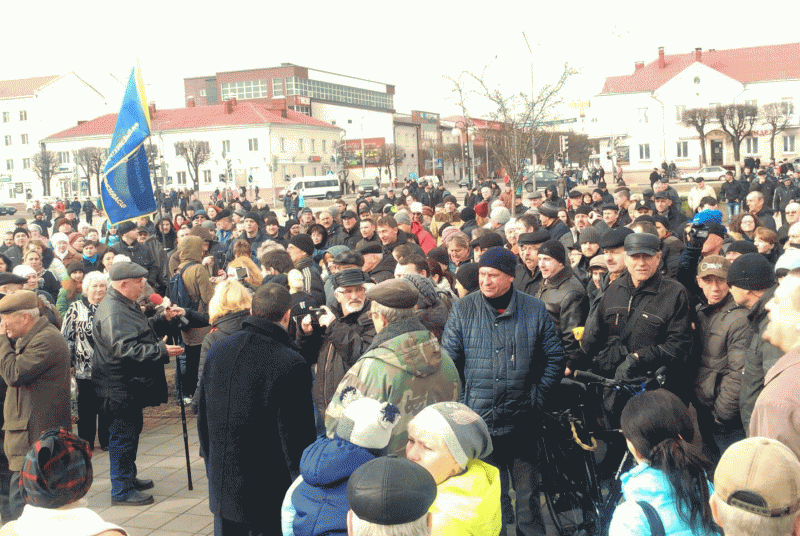Raising this at the UN Human Rights Council, on behalf of Belarusian human rights organisations, Human Rights House Foundation stated: “Everybody should be allowed to exercise their right to peaceful assembly, not be at the mercy of the authorities’ arbitrary tolerance or repression of such assemblies. The Belarusian authorities should immediately and unconditionally release those sentenced for administrative detention related to these protests.”
In the video above, Ales Herasimenka from Belarus Watch highlights the new phenomena in Belarus of protests being “largely sparked” by the internet and social media, and the leaderless nature of the of recent protests where previously unknown people, bloggers and vloggers are becoming the leaders of these demonstrations, and that anyone at any time can become a new leader.
Human Rights House Foundation, in its statement to the Council, urged Belarus to bring its legislation and practices in line with its obligations in regard to the right to peaceful assembly, stop using presidential decrees as a governance method, and abolish the social parasite legislation, which it said was “in violation of human decency.”
In an effort to combat what the President has referred to as “social parasitism,” the law targets and imposes a tax of around USD 250 on Belarusians who have worked less than half of the year and who have not registered at the country’s labour offices. The law was introduced in a 2015 decree by President Alyaksandr Lukashenka on the prevention of social dependency.
Viasna, member of the Barys Zvozskau Belarusian Human Rights House, reported on 12 March that more than 70 people have been detained, including representatives of the political opposition, civil society activists, journalists and ordinary protesters, in connection with country-wide protests opposing the social parasite law.
The crackdown on peaceful protestors in Belarus comes ahead of the unofficial Belarusian commemoration of Freedom Day on 25 March, often marked by demonstrations against the government of President Lukashenka. Crackdowns often precede important national events, following a trend that HRHF has observed in countries repressive towards independent civil society.
The civil society leaders, journalists and human rights lawyers detained face up to 15 days’ imprisonment and as a result, the protection of Belarusians participating current and upcoming protest actions and demonstrations, such Freedom Day is weakened.
Alumni lawyers from the Human Rights House Network’s International Law in Advocacy programme have brought these cases of detention to the courts, and challenged the legality of the parasite law itself, in appeals raising its non-compliance with international standards and with the constitution of Belarus.
Of these lawyers, Leonid Sudalenka, Vasily Polyakov and Andrey Strizhak are under particular pressure from the authorities and will face administrative charges in court on 17 March.
Leonid Sudalenka has been continuously targeted by the authorities, facing prosecution and threats against him and his family. Human Rights House Foundation condemns this retaliation and urges the Belarusian authorities to immediately drop the charges against him, in line with international guarantees and immunities for lawyers working on human rights.
The United Nations Special Rapporteur on human rights in Belarus, Miklós Haraszti, has stated that he is paying particular attention to the situation because of the Government’s well-known history of over-reacting to public discord.
“The recurring pattern in the authorities’ violent response makes the situation volatile enough for it to degenerate. The danger of escalation has already partly materialized as several opposition leaders, Anatol Liabedzka and Vital Rymasheuski in particular, have been sentenced to detention for two weeks,” stated the Special Rapporteur.
In addition to these two opposition politicians, Yuras Hubarevich and Volha Kavalkova have also been detained. Viasna has also reported that several of its members have been persecuted during this time. The Belarusian Association of Journalists, another member organisation of the Belarusian Human Rights House, has reported several instances of the authorities taking action against journalists attempting to cover the events.
The situation remains tense despite the announcement of the President that the application of the law would be suspended for one year in order for it to be “corrected.” The President has promised a tough reaction against “organisers of dissent” and has instructed his interior minister to ensure that “perfect order” is established in the country.
Special Rapporteur Miklós Haraszti described the decree as “an arbitrary and cruel measure,” which is estimated to affect more than 470,000 Belarusians: “These people are not only singled out and stamped as ‘society’s parasites,’ but they are subjected to substantial fines amounting to the equivalent of USD 250, or about two thirds of the average monthly wage in Belarus.”
Miklós Haraszti will present his report addressing the “social parasite” law to the Human Rights Council in June 2017.
Documents:
- Statement on Belarus at HRC34
Human Rights House Foundation, on behalf of Belarusian human rights organisations, raised the situation in the country as in need of the UN Human Rights Council’s attention in March 2017.This follows the authorities in Belarus arresting more than 100 people in connection with peaceful protests in several cities, following an outcry against a law imposing a tax on unemployed Belarusians.
More on protests against the “social parasite” law in Belarus
Viasna: Protesters, journalists detained across Belarus
RFE/RL: Hundreds Protest In Belarus City Against Tax On Jobless
Authorities Block Charter97.org Site In Belarus
According to Charter97.org, their website has been blocked in Belarus “On the back of holding of the “March of Non-Parasites” in Minsk”.
Users of the website informed Charter97.org that access to the website was blocked by Belarusian operators Beltelecom, Velcom, MTS, Life and others. Read the original article here.





